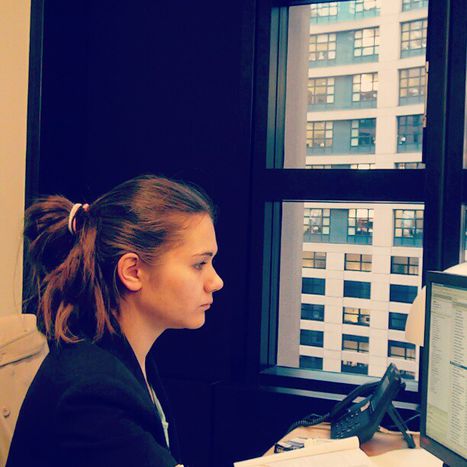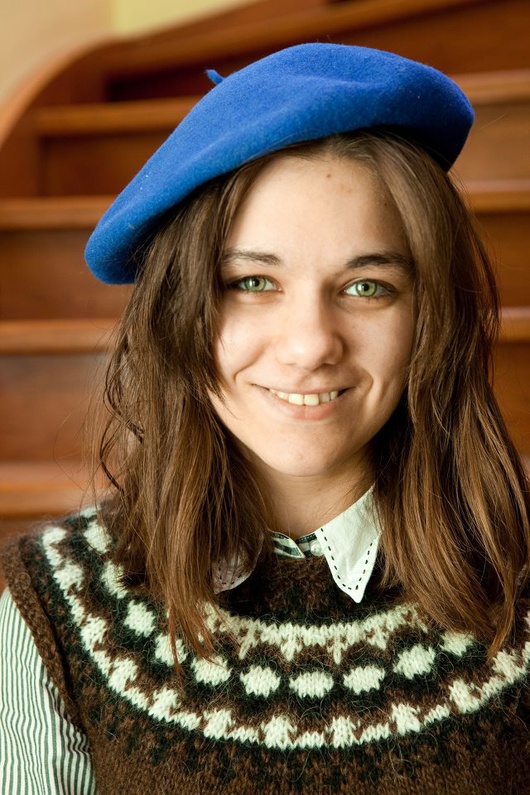
Amelia Andersdotter: Pirate and youngest EU Parliamentarian
Published on
Translation by:
 Danny S.
Danny S.
She's the youngest delegate in the European Parliament. Sometimes she asks herself why she's even there. The Swedish delegate Amelia Andersdotter, who represents the Pirate Party, is back up for election. We talk about binge drinking, the European parliament and elections.
Amelia Andersdotter carries a bright green backpack and looks around. She seems relieved as we shake hands. The youngest delegate of the European Parliament isn't in Paris that often. While walking to the café she tells me about a cyber security conference that she'll be attending the next day. But she doesn't know exactly what will be covered. To her the conference seems to be a little bit of a ghost hunt. She asks me whether I'm afraid of ghosts, to which I don't find an immediate and fitting response. We both remain silent for a bit.
Shortly before her entry into the European Parliament
She orders chips and a fragrant tea. We sit at the edge of a patio filled with young people and well-dressed Parisians. Some sit alone in front of their macbooks, while others write in their moleskin notebooks. Bearded men check out women with their light, flowing springtime dresses. The sun's still up and shining a bit. Amelia begins to frantically eat her chips.
Others Drink, she politics
Is her native country Sweden really as romantic as it's made out to be? She looks up with a serious expression. She was raised in a small village where Swedish families like to see their children grow up on the periphery of major cities. Amalia says that they feel reserved about Sweden: "Personally I think I fit well in that category." She says this without expectation of dissent from me. When she moved near Stockholm for her studies, she didn't have the impulse to drink like all the other young Swedes her age. Young Swedes loved to binge drink, she says. That was the beginning of her political career; while most of the other students lay drunk in a corner, she was busy discussing politics with her friends. "I found my political ideas at the bottom of my coffee cup." It may sound like the marks of an insider, but she says it with adamant sincerity.
 I ask her why she wants to be elected back into the European Parliament. She turns up the corners of her mouth and stares into the cloudless Parisian twilight, holding her backpack close-by. "It's difficult to say sometimes. European institutions are like an overweight whale that only turns slowly." I want to know how realistic she thinks it is for the whale to eventually turn itself: "Flies would be simplier; they immediately change direction." She demonstrates the trajectory of a fly with her hands. Maybe she's making fun of me, maybe she wants me to laugh about it-- but I'm not quite sure which.
I ask her why she wants to be elected back into the European Parliament. She turns up the corners of her mouth and stares into the cloudless Parisian twilight, holding her backpack close-by. "It's difficult to say sometimes. European institutions are like an overweight whale that only turns slowly." I want to know how realistic she thinks it is for the whale to eventually turn itself: "Flies would be simplier; they immediately change direction." She demonstrates the trajectory of a fly with her hands. Maybe she's making fun of me, maybe she wants me to laugh about it-- but I'm not quite sure which.
Her work in the European Parliament spurs her anger about the many things that don't make sense. She gives an example: recently she listened to a representative of the cable industry who said the exact same thing as one of her colleagues in parliament a couple of days before. Because many members of parliament don't know how to deal with the constant lobbying, they tell the representatives of interest groups what they want to hear. Her scathing verdict: many members of parliament--like her colleague who reiterated the words of the cable industry--lack the morals and values to resist lobby interests. That's why she's begun to evaluate who they're actually representing. According to her, it's a sickness that's gotten hold of Brussels.
Pirated!
Amelia didn't make me anymore confident in European institutions, but rather made them seem like monsters from which one should keep a distance. I couldn't help but picture an array of MEPs, whose ideas were being swallowed up by a whale and whose opinions were being screwed to unrecognizability by lobbyists. Is Europe truly so frightening?
On the contrary, says Amelia: Europe has to watch out for their continuing support of open exchange within the continent. Traditionally, Europe has only been as successful as it has, in the sciences and the arts, because Europeans have pirated from each other. Parliament has to assure that people have the freedom to borrow from each other. We used to live in a time where we make friends based on mutual experiences rather than geographical proximity.
In the end we shake hands. This time she bows slightly. Then she hurries to the exit with her green backpack. There's a lot left to do before the paliamentary elections.
Translated from Amelia Andersdotter: Politik statt saufen


